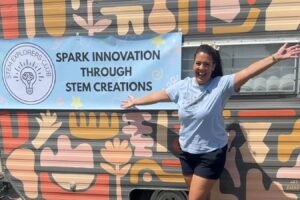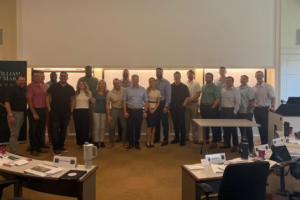
Don’t Underestimate Value of a Human Network (opinion)
This week is Thanksgiving in the United States, a time when many of us come together with family and friends to express gratitude for the positive things in our lives. The holiday season can also be a challenging time for those who are far from family and grappling with the prevalent loneliness of our modern era.
Perhaps worse than missing the company of others over the holidays is being with family who hold different views and beliefs from your own. The fact is, though, that when we come together with a large, diverse group of people at events we are bound to find a variety of viewpoints and personalities in the room.
People are complex and messy, and engaging with them is often a lot of work. Sometimes it seems easier to just not deal with them at all and “focus on ourselves” instead. Similarly, the vast amount of information available online often leads many graduate students and postdocs to think they can effectively engage in professional development, explore career options and navigate their next step on their own. Indeed, there are many amazing online tools and resources to help with a lot of this but only by engaging other people in conversation can we fully come to understand how various practices, experiences and occupations apply to us as unique beings in the world. Generic advice is fine, but it can only be tailored through genuine dialogue with another person, though some believe they can find it in a machine.
Generative artificial intelligence (AI) technology has accelerated since the launch of ChatGPT in November 2022 and now many people lean on AI chatbots for advice and even companionship. The problem with this approach is that AI chatbots are, at least currently, quite sycophantic and don’t, by default, challenge a user’s worldview. Rather, they can reinforce one’s current beliefs and biases. Furthermore, since we as humans have a tendency to anthropomorphize things, we perceive the output of AI chatbots as “human” and think we are getting the type of “social” relationship and advice we need from a bot without all the friction of dealing with another human being in real life. So, while outsourcing your problems to a chatbot may feel easy, it cannot fully support you as you navigate your life and career. Furthermore, generative AI has made the job application, screening and interview process incredibly impersonal and ineffective. One recent piece in The Atlantic put it simply (if harshly): “The Job Market is Hell.”
What is the solution to this sad state of affairs?
I am here to remind readers of the importance of engaging with real, human people to help you navigate your professional development, job search and life. Despite the fear of being rejected, making small talk or hearing things that may challenge you, engaging with other people will help you learn about professional roles available to you, discover unexpected opportunities, build critical interpersonal skills and, in the process, understand yourself (and how you relate with others) better.
For graduate students and postdocs today, it’s easy to feel isolated or spend too much time in your own head focusing on your perceived faults and deficiencies. You need to remember, though, that you are doing hard things, including leading research projects seeking to investigate questions no one else has reported on before. But as you journey through your academic career and into your next step professionally, I encourage you to embrace the fact that true strength and resilience lies in our connections—with colleagues, mentors, friends and the communities we build.
Networks enrich your perspectives, foster resilience and can help you find not only jobs, but joy and fulfillment along the way. Take intentional steps to build and lean on your community during your time as an academic and beyond. Invest time, gratitude and openness in your relationships. Because when you navigate life’s challenges with others by your side, you don’t just survive—you thrive.
Practical Tips for Building and Leveraging Networks
For graduate students and postdocs, here are some action steps to foster meaningful networks to help you professionally and personally:
Tip 1: Seek Diverse Connections
Attend seminars, departmental events, professional conferences and interest groups—both within and outside your field.
Join and engage in online forums, LinkedIn groups and professional organizations that interest you. Create a career advisory group.
Tip 2: Practice Gratitude and Generosity
Thank peers and mentors regularly—showing appreciation strengthens relationships, opens doors and creates goodwill.
Offer help, such as reviewing your peers’ résumés, sharing job leads or simply listening. Reciprocity is foundational to strong networks.
Tip 3: Be Vulnerable and Authentic
Share struggles and setbacks. Vulnerability invites others to connect, offer advice and foster mutual support.
Be honest about your goals; don’t feel pressured to follow predefined paths set by others or by societal norms.
Tip 4: Leverage Formal Resources
Enroll in career design workshops or online courses, such as Stanford University’s “Designing Your Career.”
Utilize university career centers, alumni networks and faculty advisers for information and introductions.
Tip 5: Make Reflection a Habit
Set aside time weekly or monthly to review progress, map goals and consider input from your network.
Use journaling or guided exercises to deepen self-insight and identify what you want from relationships and careers.
Tip 6: Cultivate Eulogy Virtues
Focus not just on professional “résumé virtues,” but also on “eulogy virtues”—kindness, honesty, courage and the quality of relationships formed.
These provide lasting meaning and fuel deep, authentic connections that persist beyond job titles and paychecks.
Strategies for Overcoming Isolation
Graduate students and postdocs are at particular risk for isolation and burnout, given the demands of research and the often-solitary nature of scholarship. Community is a proven antidote. Consider forming small groups with fellow students and postdocs to share resources, celebrate milestones and troubleshoot professional challenges together. Regular meetings can foster motivation and accountability. These can be as simple as monthly coffee chats to something more structured such as regular writing or job search support groups. And, while online communities are not a perfect substitute for support, postdocs can leverage Future PI Slack and graduate students can use their own Slack community for help and advice. You can also lean on your networks for emotional support and practical help, especially during stressful periods or setbacks.
Another practical piece of advice to build your network and connections is volunteer engagement. This could mean volunteering in a professional organization, committees at your institution or in your local community. Working together with others on shared projects in this manner helps build connections without the challenges many have with engaging others at purely social events. In addition, volunteering can help you develop leadership, communication and management skills that can become excellent résumé material.
Networking to Launch Your Career
Through the process of engaging with more people through an expanded network you also open yourself up to serendipity and opportunities that could enhance your overall training and career. Career theorists call this “planned happenstance.” The idea is simple: By putting yourself in community with others—attending talks, joining professional groups, volunteering for committees—you increase the odds that unexpected opportunities will cross your path. You meet people who do work you hadn’t considered, learn about opportunities before they’re posted and hear about initiatives that need someone with your skills earlier than most.
When I was a postdoc at Vanderbilt University, I volunteered for the National Postdoctoral Association (NPA), starting small by writing for their online newsletter (The POSTDOCket), and also became increasingly involved in the Vanderbilt Postdoctoral Association (VPA). These experiences were helpful as I transitioned to working in postdoctoral affairs as a higher education administrator after my postdoc. Writing for The POSTDOCket as a postdoc allowed me to interview administrators and leaders in postdoctoral affairs, in the process learning about working in the space. My leadership in VPA showed I understood some of the needs of the postdoctoral community and could organize programming to support postdocs. I have become increasingly involved in the NPA over the past six years, culminating in being chair of our Board of Directors in 2025. This work has allowed me to increase my national visibility and has resulted in invites to speak to postdocs at different institutions, the opportunity to serve on a National Academies Roundtable, and I believe helped me land my current role at Virginia Tech.
I share all this to reiterate that in uncertain job markets, it’s tempting to focus on polishing résumés or applying to ever more positions online. Those things can matter—but they’re not enough. Opportunities often come through both expanding your network and engaging with people and activities we care about. They can present themselves to you via your network long before they appear in writing and they often can’t be fully anticipated when you initially engage with these “extracurricular activities.” A good first step to open yourself up to possibilities is to get involved in communities outside your direct school or work responsibilities. Doing so will improve your sense of purpose, help you build key transferrable skills, increase your connections and aid in your transition to your next role.
Your training and career should not be a solitary climb, but rather a collaborative, evolving process of growth and discovery. A strong community and network are critical to your longterm wellbeing and success. And, in a world where setbacks and uncertainty are inevitable, connection is the constant that turns possibility into progress.
Source link



